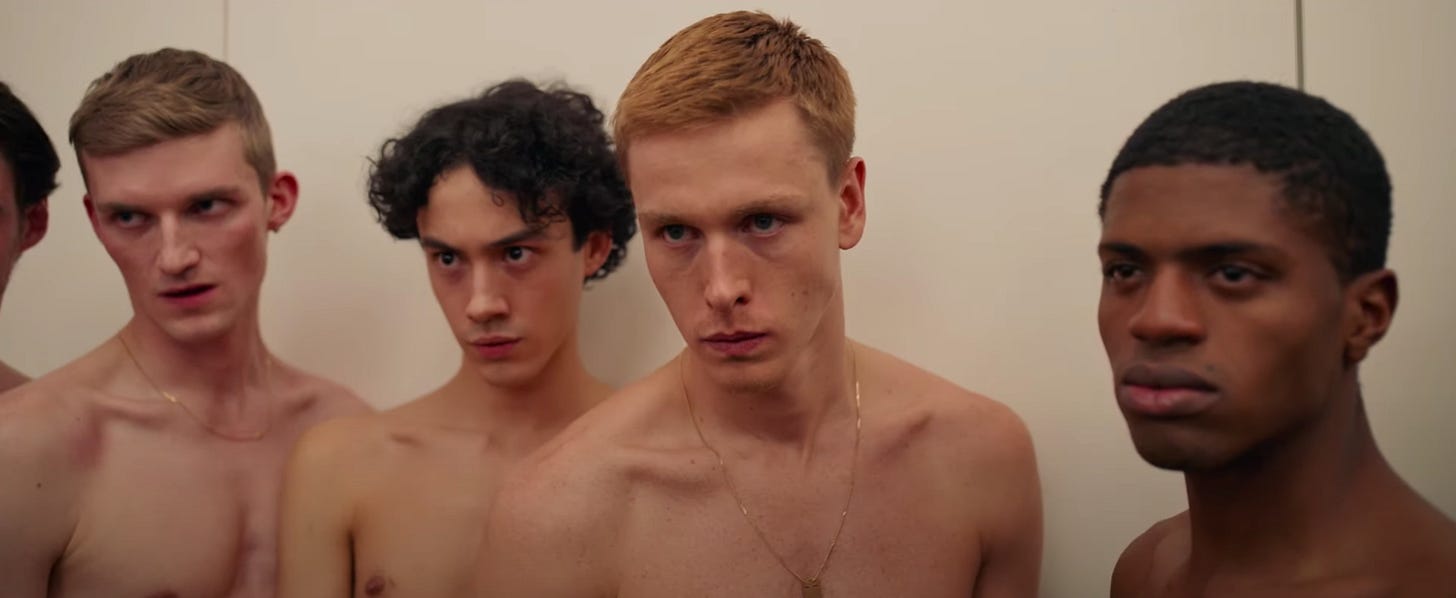Review: "Triangle of Sadness"
Ruben Östlund's second Palm d'Or winner is a too-vulgar slapstick comedy, with a lot of human bile.
Triangle of Sadness (Dir. Ruben Östlund)
Before Ruben Östlund won the Palm d’Or at this year’s Cannes Film Festival for Triangle of Sadness, a satire about influencers and the uber-rich, he won it in 2017 for The Square, a satire about influencers and the uber-rich.
Those descriptions may sound a bit facetious, and they probably are. The Square, with its hyper-focused analysis of art world elites, is certainly not Triangle of Sadness, a film with the much easier target of billionaires and Instagram influencers—a quite noticeable shift. From Triangle of Sadness’s opening scene, in which the hunky Carl (Harris Dickinson) auditions for a modeling job before a panel of stupendously demeaning fashionistas, Triangle of Sadness announces itself as sardonic and slapstick: we are meant to laugh at these characters, to point our fingers in joyful superiority at the superficiality of these superficial characters. Aren’t they just so superficial?
Such an attitude makes it hard to take interest in the film’s characters, who are written with about the depth of your cousin’s backyard kiddie pool. Östlund, who seems fully aware of this fact, instead aims to take you on a riotous tour of vulgar distractions, rocketing his snobby elites into increasingly crass set pieces that turn Triangle of Sadness into a full-on vomit-fest. And let me be clear that I mean this literally: the film’s second act, set aboard a luxury yacht liner, spends most of its time riffing on barfing billionaires sinking into the sea. Östlund’s single idea, about wealth eating itself to the point of repugnance, feels far more laborious than it does humorous, mostly because his subject doesn’t require much sophisticated analysis. Yes, billionaires are disgusting. Yes, influencers are shallow. We don’t need 149 minutes to understand that.
Fortunately, the actors are well-cast, and do substantial work in converting these characters from point-and-laugh stereotypes to actual flesh and blood. Dickinson is excellent as Carl, a young man utterly lacking the ability to deal with the glamorous life into which he was unwittingly swept. Charlbi Dean—who died tragically earlier this year—plays Carl’s girlfriend Yahya, and brings a similar subtlety to an underwritten role. The film’s first and best act is set entirely within the confines of their relationship, and works largely because of their bristling rapport.
The film’s next two acts are far less focused, and far less successful. Over the course of the aforementioned vomit-filled yacht and a Lord of the Flies-style survival tale, we are introduced to a plethora of insufferable characters, each of them possessing a varying laughable-to-hateful personhood ratio. Woody Harrelson, playing the yacht’s Marxist ship captain, and Zlatko Burić, playing a disheveled Russian oligarch, are the film’s standout performers, and share the film’s standout scene: an epically drunk conversation about the ironies of American communism and Russian capitalism.
This is one of the few times the film is aware of its own pomposity, however—most of the time, it’s just pompous. Heavy-handed comic set pieces far outstay their welcome, making one wonder what deep significance Cannes voters saw in the film. What is it that appeals to these critical elites about Östlund’s satires? Is it their masochistic need to roast themselves over a fire of pitying self-hatred?
It certainly seems to play a role. The Square, his previous Palm d’Or winner, offered a similarly bitter approach to our aristocratic rulers, yet it also possessed a care and insight that Triangle of Sadness sorely lacks. In The Square, a liberal-minded art museum curator is forced to reckon with the very social prejudices he purports to condemn, and in doing so finds himself swept up in classist bigotry. When the billionaires and Instagrammers of Triangle of Sadness come face to face with their own bigotry, they vomit. Then they vomit again, then they vomit some more.




Dear James, I have an issue with the following sentence: "What is it that appeals to these critical French elites about Östlund’s satires?" As a cinema critic, if you want to be credible, you need to check your facts and be professional. The Palme d'Or is decided by a jury made up of film directors and actors from different nationalities. The president, Vincent Lindon, is indeed French. There was one more French person, originally from Mali, Ladj Ly. The other members were : Rebecca Hall, an Anglo-American film director; Deepika Padukone, an Indian-Danish actress; Noomi Rapace, a Swedish actress; Jasmine Trinca, an Italian actress; Asghar Fahardi, an Iranian film director; Jeff Nichols, an American film director, and Joachim Trier, a Danish film director. If you are right when you talk about the Cannes voters, the following sentence is very problematic. A cheap shot that does not bring anything constructive and intelligent to your movie review.
As to your review, it is in agreement with a lot of French (elite ;-)) critics who said Triangle of Sadness should not have received the Palme d'Or.